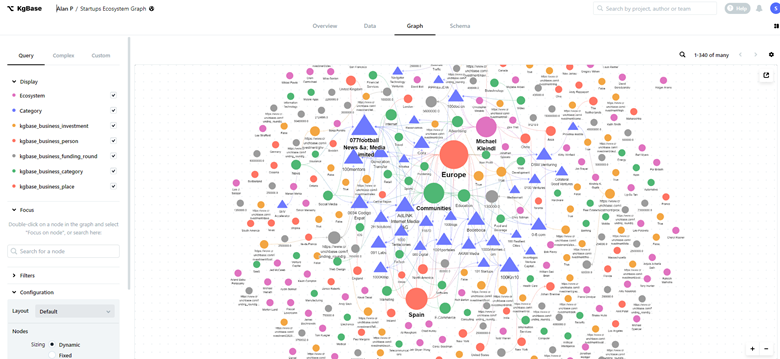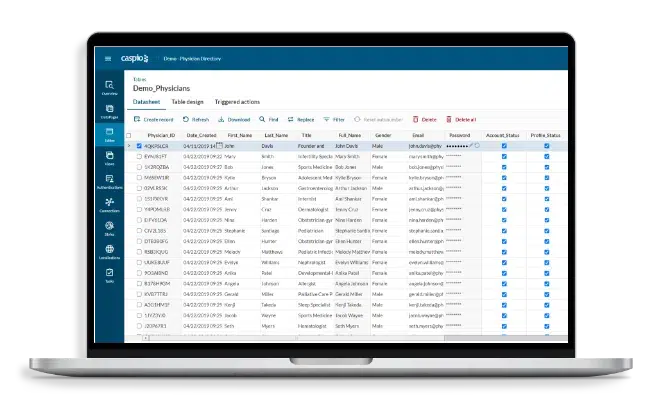Why No-Code is the Future of Open System Data Source Development for Services
Why No-Code is the Future of Open System Data Source Development for Services
Blog Article
Exploring the Advantages of Scalable Databases That Need No Coding Skills for Effective Data Administration Solutions
The development of scalable data sources that eliminate the necessity for coding skills provides a transformative chance for companies looking for effective data administration options. As we take into consideration the effects of such innovations, it comes to be crucial to analyze how they can reshape the landscape of data administration and drive sustainable growth in an affordable atmosphere.
Boosted Availability for Individuals
Improved accessibility for individuals is an important aspect of scalable data sources, guaranteeing that information monitoring systems are instinctive and straightforward. In a period where data-driven decisions are vital, ease of access allows a wider variety of individuals, including those without comprehensive technical know-how, to involve with database systems effectively. This democratization of information gain access to helps with improved cooperation across departments, encouraging workers to draw out understandings and make notified decisions.
User-friendly user interfaces, such as visual information and drag-and-drop functions representation, streamline complex information interactions. These improvements reduce the understanding curve associated with standard database administration, enabling individuals to concentrate on leveraging information instead than coming to grips with technological complexities. Scalable data sources frequently include adjustable control panels and real-time analytics, supplying users with prompt insights customized to their particular demands.

Cost-Effectiveness and Resource Savings
Effective information monitoring not only rests on accessibility yet likewise on cost-effectiveness and resource financial savings. Scalable data sources developed for customers without any coding abilities significantly minimize financial worries commonly connected with traditional data source administration systems. By removing the need for specialized programs know-how, organizations can designate their resources extra effectively, concentrating funds on core company tasks as opposed to extensive training or employing skilled workers.
Moreover, these data sources usually utilize cloud-based options, which further minimize costs associated to hardware and upkeep. Organizations can scale their database options according to their needs, preventing the costs sustained from over-provisioning resources. This versatility suggests businesses can adapt to altering needs without incurring unnecessary costs, resulting in significant lasting financial savings.
In addition, user-friendly interfaces streamline data entry and management processes, reducing the time spent on management jobs. This performance converts right into labor price financial savings, permitting groups to concentrate on critical campaigns as opposed to regular upkeep. Generally, embracing scalable data sources that call for no coding abilities promotes a much more cost-efficient technique to information monitoring, making it possible for companies to optimize their sources while preserving high degrees of functional effectiveness.
Improved Collaboration Across Teams

Additionally, scalable data sources facilitate seamless communication amongst staff member. With user-friendly interfaces that need no coding abilities, staff members can easily produce, customize, and share records or control panels tailored to their particular requirements. This democratization of information empowers non-technical users to add understandings, boosting the collaborative environment.
Additionally, these databases support concurrent gain access to, enabling several individuals to function on the very same dataset simultaneously. This function improves performance, as groups can engage in joint data evaluation without the danger of variation control concerns. The capacity check to leave remarks or notes straight within the data source even more advertises discussion and clarifies data interpretations.
Streamlined Data Administration Processes
In today's data-driven atmosphere, companies identify the necessity of streamlined information management processes to make the most of effectiveness and accuracy. By leveraging scalable databases that need no coding skills, services can streamline their data handling and minimize the intricacies typically connected with conventional data source systems. This accessibility empowers non-technical users to engage straight with information, promoting quicker decision-making and minimizing dependence on specialized IT workers.
Streamlined information administration processes boost process by automating routine jobs such as information entry, recognition, and coverage. Automated information integration guarantees that information from numerous sources is aggregated flawlessly, getting rid of silos and fostering an unified sight of vital company metrics (no-code). Straightforward interfaces permit personnel to control information easily, enabling them to produce understandings that drive strategic efforts without the demand for comprehensive training.
This effectiveness not just accelerates functional procedures yet also lessens the possibility for human error, making sure that data remains trustworthy and exact. Eventually, structured information management processes with scalable data sources lead to enhanced efficiency, permitting companies to concentrate on core activities while making certain that their data administration methods are effective and reliable.
Scalability for Growing Services

For broadening business, the ability to scale up or down is crucial. A scalable he said data source can manage an influx of data created from new customers, items, or solutions, making certain that service operations remain nonstop. These databases give the ability to manage peak lots effectively, which is vital throughout durations of rapid development or seasonal spikes.
Additionally, several scalable database remedies are created with easy to use interfaces that need no coding skills, encouraging non-technical personnel to manage information effectively (no-code). This democratization of information management permits organizations to allot resources purposefully and reduce reliance on specialized IT personnel
Eventually, adopting a scalable database not just improves functional efficiency however additionally promotes a setting where companies can progress and introduce without the restraints of conventional database systems. This versatility placements organizations for long-lasting success in today's affordable landscape.
Verdict
To conclude, scalable databases that call for no coding abilities provide considerable benefits for efficient information management. These systems boost availability for non-technical users, decrease functional prices, and promote collaboration throughout teams. By improving information monitoring procedures and using scalability for growing organizations, such solutions allow companies to adjust to transforming demands successfully. Ultimately, the adoption of these easy to use data sources promotes innovation and positions businesses for long-term success in a dynamic atmosphere.
Boosted access for customers is a vital element of scalable databases, making sure that data management systems are intuitive and straightforward.Easy to use internet interfaces, such as drag-and-drop attributes and visual data depiction, simplify complex information interactions. Overall, taking on scalable databases that call for no coding skills fosters an extra cost-efficient method to information administration, enabling organizations to optimize their resources while keeping high levels of functional efficiency.
By leveraging scalable data sources that require no coding abilities, businesses can simplify their information handling and decrease the intricacies generally linked with conventional data source systems - no-code.Streamlined information management processes enhance process by automating regular jobs such as data access, validation, and reporting
Report this page